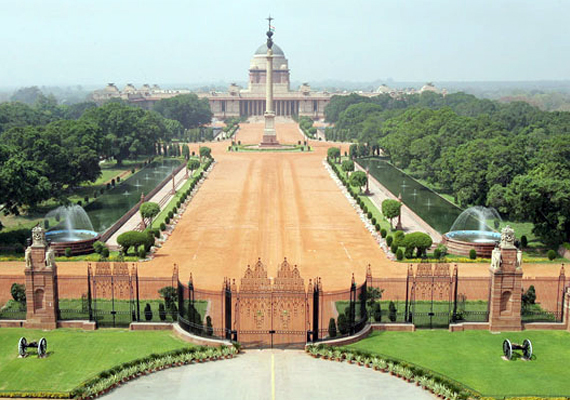New Delhi, July 24: Till 1950, the Rashtrapati Bhavan on Raisina Hill was called the Viceroy House, the residence of the then Governor General of newly independent India.
There are 340 rooms inside the palatial building, and is considered the world's biggest residence of a president.
The incumbent President does not stay in the rooms where the British Viceroys used to reside. Instead, they reside inside the guest rooms.
The first Indian Governor General C Rajagopalachari did not like the main bedroom, and opted for the guest room. This tradition was later followed by all subsequent presidents.
The Rashtrapati Bhavan is the symbol of India's national sovereignty and a mute witness of India's glorious history.
The Durbar Hall, Ashoka Hall and Banquet Hall are the main halls of this four-storeyed building.
All ceremonies take place inside the Durbar Hall. The banquet hall is used to host banquets for state guests, while the ornate Ashoka Hall is used for swearing-in ceremonies and other state functions.




The main architect of Rashtrapati Bhavan was Sir Edwin Lutyens, the builder of modern New Delhi. Lutyens had once remarked that the money spent on the Rashtrapati Bhavan was less than the money spent on two warships during that time.



Rs 1.45 crore was the amount spent on building the Rashtrapati Bhavan, which took 15 years to be built. The Viceroy House, work for which began in 1914, was inaugurated in 1931.

Yellow Drawing Room, is used for smaller State functions like swearing-in of Comptroller and Auditor General, Chief Election Commissioner and induction of a solitary Minister in the Union Council of Ministers. Grey Drawing Room is adjacent to Yellow Drawing Room and is used for reception and is used for serving refreshments to guests at these meetings.

State Dinning Hall, now known as Banquet Hall. Can seat 104 persons. Portraits of all former Presidents embellish its walls. An assortment of medieval arms on display.


The Ashoka Hall,which gives the feel of a large jewel box, is a rectangle measuring 32 metres by 20 metres.It was originally built as the State Ballroom:it has a wooden floor,a central dance space, and three vestibules. Unlike most halls and chambers in Rashtrapati Bhawan, the Ashoka Hall has a painted ceiling. The painting is in the Persian style. The main painting on the roof depicts a royal hunting expedition while those towards the corners show scenes from court life.Dark colours predominate. And because the painting has been done on leather, even white takes on a brown tint. The work was commissioned by Lady Willingdon when her husband was Viceroy.

North Drawing Room for receiving visiting Heads of State.Two paintings are conspicuous: Transfer of power on August 14 by Shri S.N.Goshal and Swearing-in ceremony of First Indian Governor General by Shri Thakur Singh.

Museum also know as has etchings of Thomas Daniel and William Daniel and autographed photographs of several Heads of States. Also on display are a number of gift items received by the President during visits abroad or during India and from visiting Heads of State at New Delhi including a dry sunflower which adorned the mortal remains of Mahatma Gandhi on January 31, 1948, 1 K.M. long thread of superfine Khadi spun by a weaver in Nadia Dist. (West Bengal), the 640 Kg. silver chair used by King Emperor at the Delhi Durbar in 1911-12.

Statues of King George V and Queen Mary, life size and bust size oil portraits of former Viceroys and Governors General, the silver chair for the Queen, the brass replica of British Crown.

Statues of King George V and Queen Mary, life size and bust size oil portraits of former Viceroys and Governors General, the silver chair for the Queen, the brass replica of British Crown.

Statues of King George V and Queen Mary, life size and bust size oil portraits of former Viceroys and Governors General, the silver chair for the Queen, the brass replica of British Crown.

Durbar Hall - 2-ton chandelier hanging from a height of 33 meters. Known during the British rule as Throne Room. There were 2 separate thrones for the Viceroy and Vicereine which have now been replaced by a simple chair for the President. Statue of Gautam Buddha belonging to Gupta period, 5 Century, A.D, benedicting from behind. Used for State functions: Defence Investiture ceremony, conferring of Padma Awards, etc

